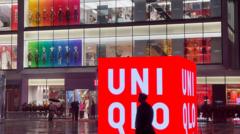In a recent interview, the CEO of Uniqlo, Tadashi Yanai, confirmed the company’s commitment to not sourcing cotton from China's Xinjiang region, where reports of forced labor practices have emerged. His comments come amidst rising scrutiny from Western markets coupled with the need to maintain favor in China. Despite navigating this complex landscape, Yanai remains focused on expanding Uniqlo’s footprint while promoting sustainability over fast fashion trends.
Uniqlo's CEO Confirms Brand No Longer Uses Xinjiang Cotton Amidst Global Backlash

Uniqlo's CEO Confirms Brand No Longer Uses Xinjiang Cotton Amidst Global Backlash
Uniqlo chief Tadashi Yanai addresses the controversial sourcing of cotton, emphasizing transparency without compromising market position in China.
In a notable shift, Tadashi Yanai, the CEO of Uniqlo's parent company Fast Retailing, disclosed to the BBC that the fashion retailer does not use cotton sourced from the Xinjiang region of China. This statement marks Yanai's first direct acknowledgement of the contentious issue surrounding Xinjiang cotton, notorious for allegations of being produced with forced labor from the Uyghur ethnic minority.
As a vital market for both sales and manufacturing, China has been crucial to Uniqlo's operations. Yanai's remarks, while aimed at establishing transparency regarding their cotton sourcing, also highlight the delicate balance of maintaining a presence in the Chinese market while adhering to ethical sourcing standards. The U.S. has implemented strict regulations regarding imports from Xinjiang, compelling global brands to reassess their supply chains. Many, including H&M and Nike, faced severe backlash and boycotts in China for distancing themselves from Xinjiang cotton, which had been regarded as premium fabric in the past.
Previously, Yanai refrained from confirming or denying accusations of using cotton from the region, preferring to stay neutral amid geopolitical tensions. However, by stating, “We’re not using [cotton from Xinjiang],” he shed light on his company’s strategy to be more forthright about sourcing, though he chose to refrain from delving deeper into the topic for fear of exacerbating political tensions.
Isaac Stone Fish of Strategy Risks highlights that the pressure on companies to take sides is escalating, indicating that remaining neutral in the current political climate is no longer tenable. Despite challenges in an increasingly competitive market, particularly against the backdrop of the ultra-fast fashion movement represented by brands like Shein, Yanai maintains that Uniqlo's focus lies on long-lasting, essential products rather than disposable fashion.
Despite Uniqlo's burgeoning expansion in Europe and the U.S., where Yanai acknowledges that the brand is still largely unknown, he sees immense potential in China, home to 1.4 billion potential customers. He aims to increase the number of Uniqlo stores in China from 1,000 to 3,000 in the near future.
While Uniqlo also produces apparel in other countries such as Vietnam and India, the challenges of replicating China’s success as a manufacturing powerhouse remain significant. As the fashion industry grapples with increased scrutiny over human rights, Yanai's ambitions to become the largest fashion retailer globally hinge not just on growth in China but also on appealing to a Western customer base increasingly aware of ethical procurement.
Nonetheless, Yanai faces potential obstacles, especially if political tensions increase with the return of Donald Trump, who is expected to impose heavier tariffs on Chinese goods. His vision for Uniqlo's future thus involves navigating complex geopolitical terrain while adhering to a strategy that favors sustainability and ethical sourcing.



















